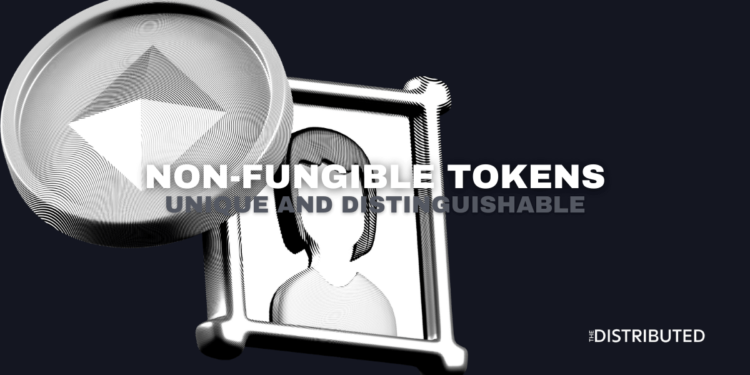What Is A Non-Fungible Token (NFT)?
A non-fungible token (NFT) is a digital asset stored on a blockchain. NFTs have unique metadata and identifiers encoded within them which distinguishes them from other tokens and this data cannot be falsified.
The term non-fungible is something that cannot be traded like for like. This is in direct comparison to cryptocurrencies which are fungible and can be like for like, which is why they serve better as a means of transaction.
How Do NFTs Work?
NFTs were widely adopted after “ERC: Non-fungible Token Standard #721” was published on GitHub on September 23rd, 2017. From there Ethereum Improvement Proposal 721 evolved and brought to life the first NFTs on the Ethereum blockchain.
The ERC-721 standard implements an API for smart contracts within tokens.[1]Ethereum – ERC-721 Non-Fungible Token Standard This would allow for defining features such as signatures or identifiers to be encoded within a token while being able to trace its legitimacy back to the official smart contract.
As NFTs are tokens, they can still be traded and exchanged through blockchains, although not like for like. NFTs are purchased and sold with cryptocurrencies. Through this process, ownership is able to be tracked back to the NFTs minting and thus able to verify a token’s legitimacy through the blockchain distributed ledger.
NFTs may also be fractionalized, this allows for split ownership of a single asset. This broadens the accessibility to the NFT market, which in some cases, is too expensive for a majority to invest in.
Uses For NFTs
Digital Art
The primary use case at the moment for NFTs is digital art, owing to the profile picture boom of 2021. The content creator economy is enhanced by putting content ownership back into the creator’s hands.
There is a lot of controversy around the digital art sector, namely that they can be saved onto your own device. The difference between JPEGs and NFTs lies in the verifiable ownership of the asset.
The shift to a more creator-friendly economy means that creators can choose to host events such as Gary Vaynerchuck’s “VeeCon” which was available to those who own a verifiable VeeFriends NFT, not a screenshot of one.
Games
NFTs have become a core part of Web3 games, namely to represent in-game items such as characters, items, and assets within the game. Games such as sandbox offer users to buy plots of land, characters, and accessories.[2]OpenSea – The Sandbox[3]OpenSea – The Sandbox Assets
Identity
NFTs can possibly replace physical, non-fungible certificates like driver’s licenses, passports, etc. through the use of soulbound tokens which are non-transferrable NFTs. Having this data implemented online may reduce the amount of fraud and crime, it would also lessen your online anonymity.
Although, this would also allow you to track where your data is sent and put more control into the hands of your own data, through the use of smart contracts and other types of programming.[4]Privacy Affairs – The New Use Case for NFTs – Solving Online Identity Verification
Music
Similar to digital assets, music NFTs have allowed musicians to control the distribution of their music by putting the control back into the creators. Artists like Eminem[5]Billboard – Eminem’s First NFT Drop, ‘Shady Con,’ Includes One-of-a-Kind Slim Shady-Produced Beats and Grimes[6]The Verge – Grimes sold $6 million worth of digital art as NFTs have been quick to adopt the technology to release their music in a new way.
Domain Names
NFT domains allow users to change their long and hard-to-remember wallet address to something longer such as “ethereum.eth” on the Ethereum Name Service (ENS) or “bitcoin.bit” on Namecoin. Working similarly to a web domain, on the blockchain instead.
What Is The Point Of NFTs?
NFTs at their base represent digital and verifiable ownership, this can be for digital items or physical items. This ownership is easily transferable between peers.
Tokenizing digital or physical assets can make the process of buying, selling, and trading safer and lessen the risk of fraud while increasing market efficiency.
Are NFTs Safe?
NFTs utilize blockchain technology and are protected through cryptography and encryption methods. Blockchains are run by nodes distributed throughout the world and not centralized entities making them heavily resistant to hacks, attacks, and fraud. Although, the platform where the NFT is hosted may be attacked or fall under, jeopardizing your tokens.
To keep your NFTs safe you must store them in a wallet and not on an exchange, enable two-factor authentication, and not click any links of sorts. Not your keys, not your NFTs.
NFTs And Copyright
Owning an NFT doesn’t automatically grant the copyright to the asset.[7]The Wall Street Journal – NFTs Are the Biggest Internet Craze. Do They Work for Sneakers? The property rights associated with an NFT depends on what is encoded within the smart contract,[8]Cooper Grace Ward Lawyers – Intellectual property law implications of non-fungible tokens so unless agreed upon otherwise the creator retains the copyright title.
What Was The First NFT?
The first NFT was called Quantum. It was created by Kevin McCoy and Anil Dash in May 2014. The GIF was registered on the Namecoin blockchain, being sold for $4 to Dash from McCoy during a live presentation in New York City.[9]Seven on Seven 2014: Kevin McCoy & Anil Dash McCoy and Dash described the technology as “monetized graphics”.[10]The Atlantic, Anil Dash – NFTs Weren’t Supposed to End Like This

References



